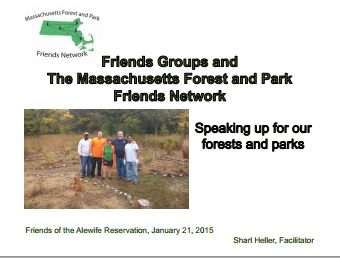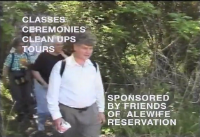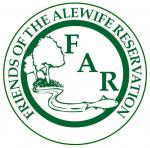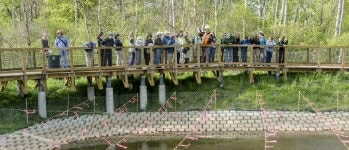(Requires agencies to withhold permits on floodplains and areas of flooding sensitivities.)
Heidi Davis
Acting Section Chief, Wetlands Program Bureau of Resource Protection
MassDEP NERO
As of 2009, Massachusetts General Laws include the highlighted text below as part of Section 61 of Chapter 30, which is part of Title III or Part I of the Massachusetts General Laws. It is my understanding that this text applies to state agencies such as the DEP when they are issuing permits under the WPA.
Section 61. All agencies, departments, boards, commissions and authorities of the commonwealth shall review, evaluate, and determine the impact on the natural environment of all works, projects or activities conducted by them and shall use all practicable means and measures to minimize damage to the environment. Unless a clear contrary intent is manifested, all statutes shall be interpreted and administered so as to minimize and prevent damage to the environment. Any determination made by an agency of the commonwealth shall include a finding describing the environmental impact, if any, of the project and a finding that all feasible measures have been taken to avoid or minimize said impact.
In considering and issuing permits, licenses and other administrative approvals and decisions, the respective agency, department, board, commission or authority shall also consider reasonably foreseeable climate change impacts, including additional greenhouse gas emissions, and effects, such as predicted sea level rise.
As used in this section and section sixty-two, “damage to the environment” shall mean any destruction, damage or impairment, actual or probable, to any of the natural resources of the commonwealth and shall include but not be limited to air pollution, water pollution, improper sewage disposal, pesticide pollution, excessive noise, improper operation of dumping grounds, reduction of groundwater levels, impairment of water quality, increases in flooding or storm water flows, impairment and eutrophication of rivers, streams, flood plains, lakes, ponds, or other surface or subsurface water resources; destruction of seashores, dunes, marine resources, underwater archaeological resources, wetlands, open spaces, natural areas, parks, or historic districts or sites. Damage to the environment shall not be construed to include any insignificant damage to or impairment of such resources.
My understanding is that the highlighted text became part of official law in 2009, and was added as a result of the Acts of 2008, which included Section 7 of Chapter 298, An Act enhancing Global Warming Solutions Act:
Be it enacted by the Senate and House of Representatives in General Court assembled, and by the authority of the same as follows: SECTION 7. Section 61 of chapter 30 of the General Laws is hereby amended by inserting after the first paragraph, as appearing in the 2006 Official Edition, the following paragraph:
In considering and issuing permits, licenses and other administrative approvals and decisions, the respective agency, department, board, commission or authority shall also consider reasonably foreseeable climate change impacts, including additional greenhouse gas emissions, and effects, such as predicted sea level rise.
- Home
- Directions
- FAR Wildlife Blog
- Calendar
- News
- Donate Now
- Get Social!
- Storm Water Wetlands
- Plants and Restoration
- Photos
- Videos
- About & Projects
- Master Plan for Alewife
- Archive
- Newsletters
- Contact
 Presentation Spotlighting Alewife Reservation
Presentation Spotlighting Alewife Reservation
 Follow us on Twitter
Follow us on Twitter
 Like us on Facebook
Like us on Facebook
 Follow us on Instagram
Follow us on Instagram
Forward our web address to a friend!
- An Urban Gem - Alewife Reservation Nature Preserve
- Envisioning The Silver Maple Forest
- History and Policies of Cambridge, Belmont, and DEP
- Storm Water Wetlands
- Friends of Alewife Reservation brochure
(front, back) - Technical Analysis of Upper Alewife Basin
- Watershed: An Excursion in Four Parts
- The River Is A Restless Spirit: Life in the floodplain forest
-
Assessment of Silver Maple forest for DEP Adjudicatory hearings and
Patrick Fairbairn, author of the Assessment - Community Native Garden Flora
The
Alewife Reservation
is a unique natural resource for the communities of Belmont, Arlington and Cambridge
and home to hundreds of species, including hawks, coyotes beavers, snapping turtles, wild turkeys and muskrats,
the reservation is a unique natural resource for the community.
Historical information (Powerpoint)
Friends of Alewife Reservation works to protect and restore this wild area and the surrounding area for the water quality, native plants, animals and over 90 bird species with paths for walking, running and biking, recreation, and for classroom education and research. We regularly steward and preserve the Reservation area for wildlife and for the enjoyment of present and future generations.

(video)
By-Laws
About Friends of Alewife Reservation
Statement of Purpose
Citizen Forester newsletter archive
The Birds of the Cambridge Region of Massachusetts

by William Brewster 1906
Nuttal Ornithological Society
Biodiversity Study of Alewife Reservation Area: Species, Habitat, Ecosystems

Inventories by David Brown, wildlife assessor (2003, 2004.) Published by and available from FAR for $10. Write or call for your copy. (sample)
Updated Dave Brown Inventories (2008, 2010)
Inventories of Alewife Reservation Wetland Plants by Walter Kittredge, Botanist (2013)

